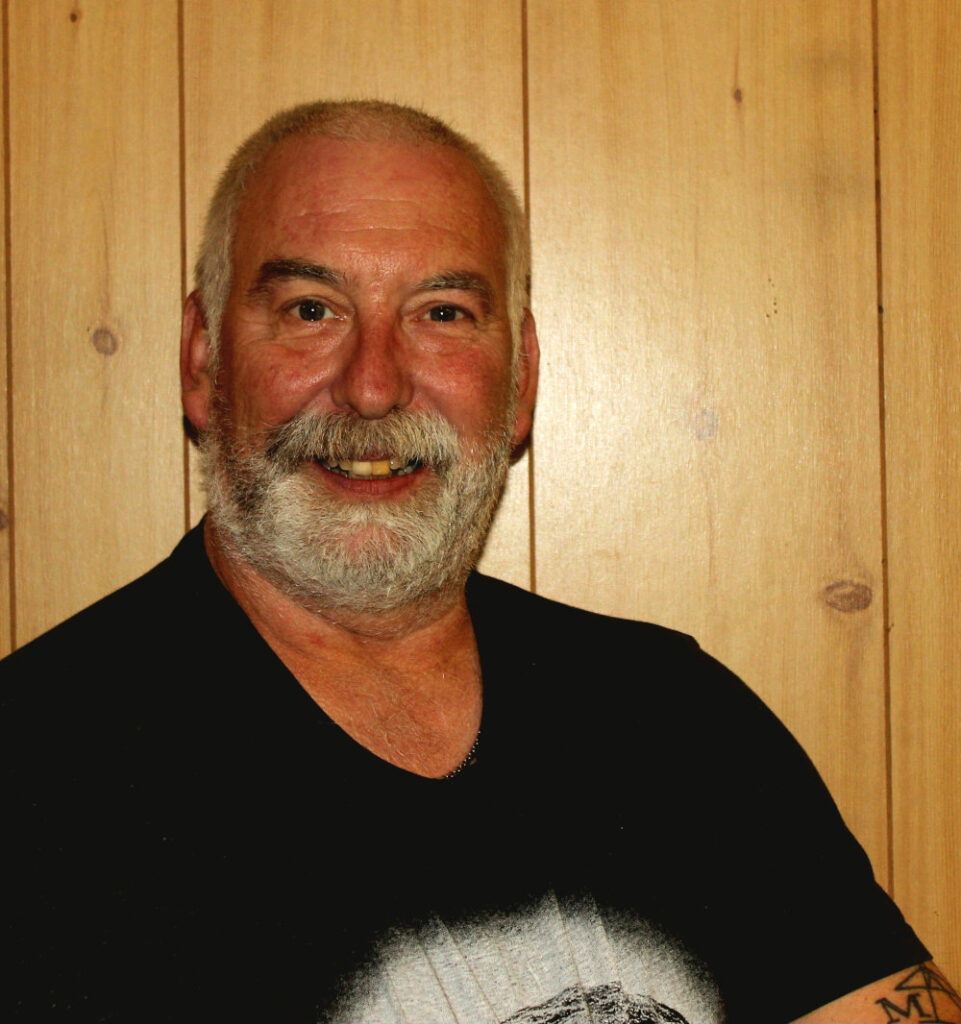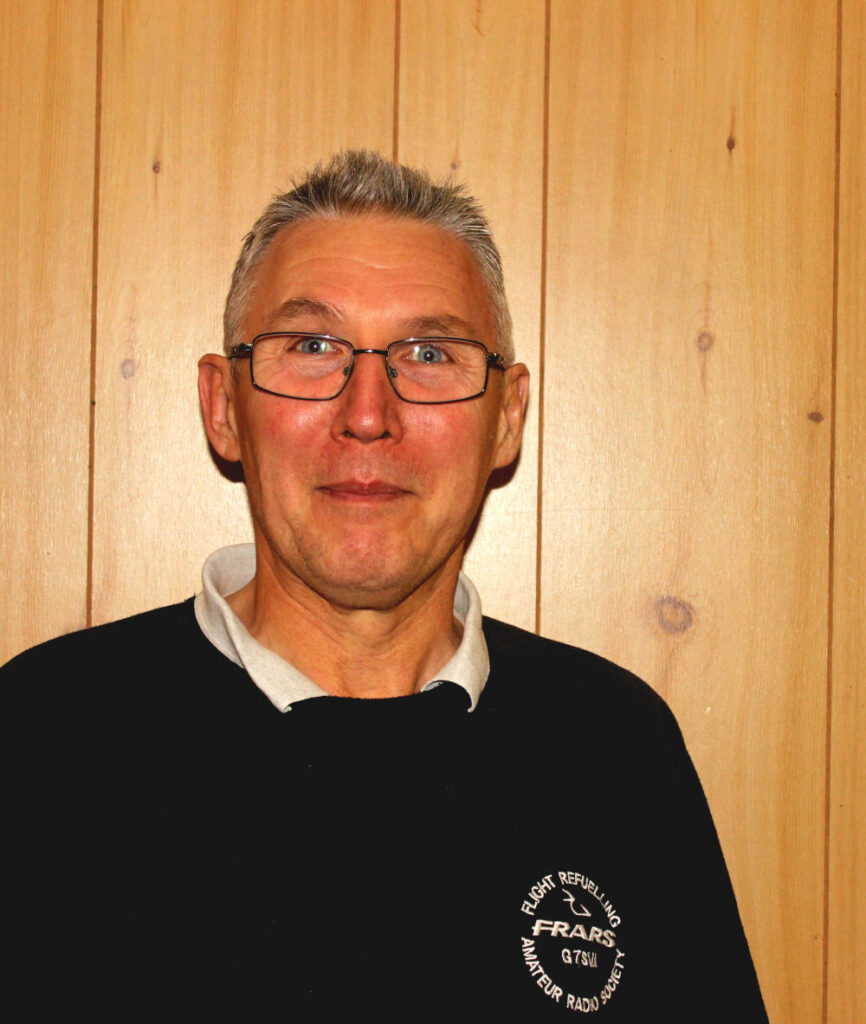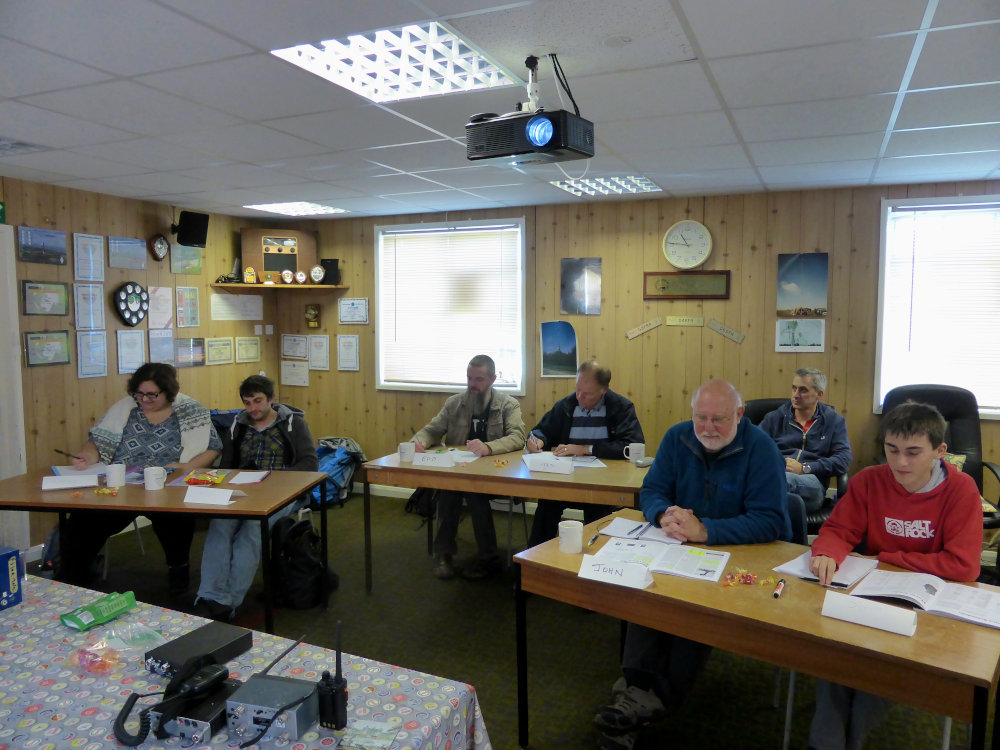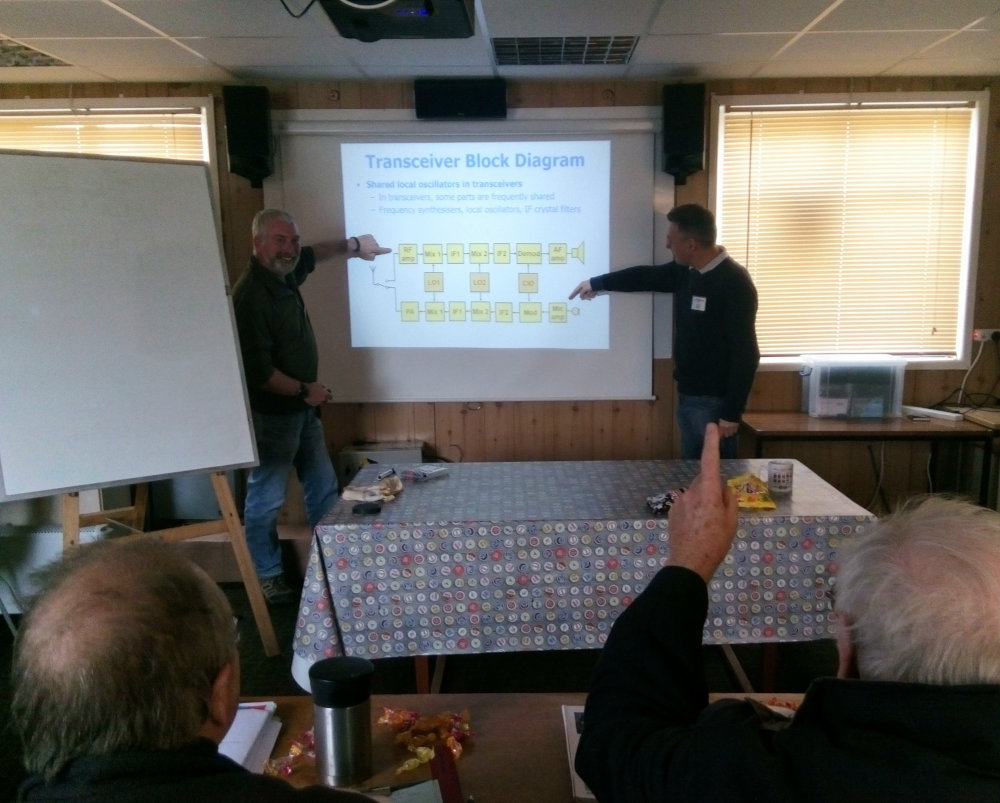Foundation Training Course Review
At Flight Refuelling Amateur Radio Society, we are passionate about helping the hobby to continue in Britain. Since 2012 we have run regular training courses and helped many people become amateur radio operators. If you are interested, either in getting licensed or in moving up the licensing ladder, then please do get in touch with us to find out what we can do for you using the contact form here.


Our training team is a two man unit.
Alan M0VLT (above left) is the lead instructor. Alan has spent his working life in the electricity industry, with over a quarter of a century climbing electricity pylons. Now working as an electrical and electronics engineer, Alan is usually to be found in the workshop with a soldering iron.
Clive G7SVI (above right) has a strong IT background and is currently a college lecturer specialising in cyber-security. He loves playing with the Raspberry Pi micro-computer and operating through Amateur satellites.
I guess the first question is ‘Are we any good?’
The statistics speak for themselves. Since we started keeping records in 2013 when Alan became the lead instructor, we have had 114 people come through our foundation courses and succeed in the exam, many with a 100% pass mark. We have had a handful who haven’t made it through, mostly youngsters who have then returned for a re-sit and passed. However, the adults who have not passed have usually not read the Foundation training book before coming to the course.
The number of people who go on to study for the intermediate license has been sitting at around 35% of those who pass at Foundation level, and we are seeing the same trend at FRARS. Since 2013 we have trained 46 students, all of whom have passed the intermediate licence exam with us first time.
So with results like that, we must be doing something right! Virtually all of our Intermediate students have passed their Foundation with us and come back. And we don’t stop there, as you’ll see later.
It’s not just the fact that we are so successful that keeps students coming to us. We provide the types of courses that students want.

Not that many clubs these days are in a position to provide training. That may be down to lack of premises or lack of trainers. Many of the clubs who do offer courses hold them on club nights, for perhaps two hours a week over a period of eight to twelve weeks. A lot of students find this too much of a time commitment, and in our opinion the drawn-out training period certainly does not help students. Many clubs will only teach club members, we’d love you to join FRARS, but that’s your choice. We have a minimum age limit of 13, mainly because of the technical nature of the subject. However, we do recognise that not all people are equal and we will look at younger students if they have the ability. Our youngest student was a nine-year-old, she passed with FRARS.
We are different. Our training courses are run over weekends, when we have dedicated use of our club’s facilities. The Foundation course is perfectly designed to be delivered in one weekend! The intermediate course is delivered over two non-consecutive weekends, with a weekend in between.
The courses used to have mandatory practical assessments which had to be carried out before the exam could be taken, this requirement has now been removed but is at the discretion of the trainers. At Foundation, we have retained a couple of the assessments because we feel they are useful to the students and add value to the training, though they are no longer examined and you cannot fail them.
People learn in different ways, and at FRARS we recognise that. Some can learn from a book, some need to have things explained to them, and some can only learn by doing.
We’ve all been on the standard ‘death-by-PowerPoint’ type training courses, where you’re wishing the time to pass. Where an instructor will sit and read at you. Where they waffle for ten minutes, then say ‘but you don’t need to know that for the exam’. Those courses are so dull, aren’t they?
We’re not like that! OK, we use PowerPoint. It’s a great tool and it helps us not to go too far off topic. What we don’t do is sit down while we’re teaching. We are on our feet all of the time, moving around. We find that this helps to keep students engaged. We use humour as much as we can for the same reason, if the course is fun then learning is fun. If learning is fun then learning is easy.

We don’t read straight from the book, in fact we don’t even refer to it. We ask that students read through the book a few times before the course starts, mainly so that they become familiar with the terminology that we will be using. We then explain the contents of the book in our style, in our words, in our way. If there is something that a student doesn’t understand then we’ll take that on board. Rather than merely repeating what we’ve said, we are adept at flipping things around, looking at them from a different angle, using analogy or example to help explain. We can adapt to most people’s learning styles on the fly.
And we are the same at Intermediate level as well. I mentioned the Intermediate course being delivered over two non-consecutive weekends, with a weekend in between. Again, we tailor the training to suit the students. Exams have to be booked in advance, so they are booked for the third weekend. A majority of the training takes place over the first weekend, and is usually completed on the Sunday of the third weekend (exam day). That is all we’ve needed so far – three days. However, if students need extra time with us, we will know by the end of the first weekend (actually we’ll have a good idea a lot sooner than that). We have the Saturday of the third weekend available to us, and we are always available for the middle weekend as well. It’s never a case of rushing things through, it’s all about giving our students the best opportunity to pass the exam.
We don’t abandon you after you’ve passed the intermediate exam, there’s help available for you if you want to progress to the Full licence – the UK’s highest amateur radio licence level.
We do not run a Full licence course. There is a lot to learn, which means there’s a lot to deliver. There are only two of us and we are volunteers. But by the time you get to the stage of looking at the Full manual you should already have significant amounts of operating practice and be familiar with most of the principles. The Full is quite heavy on theory, not unreasonably given the privileges it affords you. We’ve found that most students are OK with learning from the book at this stage, but a fair few are not coming from a technical background and there are two sections where face-to-face training is the better option for almost everyone. To overcome this obstacle, we have put together two, one-day ‘primer’ sessions dealing with these topics.
Clive does a one-day session on transmitters and receivers, covering everything in the book but explained more clearly, and with the help of further diagrams. Alan offers a one-day session covering maths (let’s face it, many of us haven’t used what we learned at school in many years) and electronics (one subject that really does need explaining). Neither of these primers is compulsory, they can be delivered in either order, you can do just one if that suits you.
So there you go, that’s what we do, and it’s why we get such great results too. So much so that people are willing to travel a fair distance to attend one of our training courses. FRARS is based just outside Wimborne in east Dorset. We have had students come to us from Devon, Hampshire, Buckinghamshire, one chap came down from Birmingham, and we even had a student from York – a 600 mile round trip for the weekend!
Unlike a lot of clubs, our premises has full internet with both Wi-Fi and optional LAN connections in our training room. All exams are done on-line now, with an instant indication at the end of the exam to show your result.
If all this has tempted you to make use of our training facilities here at FRARS, please get in touch through the link at the top of this page. Courses are run on an ‘as-needed’ basis rather than at a fixed frequency, our minimum course size is two students, for practical reasons we have an upper limit of eight students. Again though, we are flexible. If you have a large group and your own premises, we can tailor the training course around that. The training team travelled to Devon in 2015 to deliver the Foundation course to a group of ten students.
Once you’ve signed up, you’ll get regular emails from our exam secretary to remind you of things you need to do, where and when to attend – and that you need to read that manual!
So if you’ve always wanted to get licenced but there have been hurdles in the way, please do get in touch with us and we’ll do what we can to help you.
Article by Sue M0PSZ, 8/11/2023.
